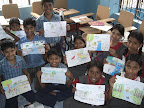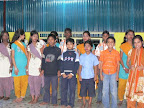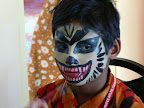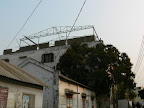 As a third year medical student, the opportunity to volunteer with such a noble program is truly a life changing moment in ones life. The first day I arrived in Dhaka, after a long two day journey from New York, I was immediately greeted by two of the warmest, most sincere, and honorable men who not only welcomed me into their country, but into their homes.
As a third year medical student, the opportunity to volunteer with such a noble program is truly a life changing moment in ones life. The first day I arrived in Dhaka, after a long two day journey from New York, I was immediately greeted by two of the warmest, most sincere, and honorable men who not only welcomed me into their country, but into their homes.Upon entering the Dhaka Project for the first time, I was overwhelmed by the enthusiasm of each and every child. The desire for success, drive for change, and limitless ambition was unparalleled. As I was introduced to each class of students, the beaming smiles that greeted me will forever leave a lasting impression in my heart. One by one students rose and introduced themselves by name and age, dreams and goals. One female in grade IV told me she was nine, and wanted to be the next Prime Minister of Bangladesh! Lofty dreams not only separate the students of The Dhaka Project from other schools in the area, but it defines them.
My time at The Dhaka Project was spent at the Medical Center, as attaché to Dr. Jahid. Polio inoculations, Rhinitis, Scabies, sweltering fevers, invasive diarrhea, emergent sutures for an open wound head injury, and that was just my first day! Daily protocol involves checking for any immediate medical conditions that students may have presented with upon entering the school. The cases have varied from open wound sores, to severe upper respiratory distress. As the morning progresses, we first tend to the needs of the nursery, followed by any individuals of the pre-school who may have taken ill. The most prevalent diagnosis has been conjunctivitis, Rhinitis, and abdominal discomfort (no doubt due to rapid season change, and abundant dust that fills the dry fields where many of our students play).
Afternoon rounds involve going through daily sick lists, class by class. The nurse goes to one classroom at a time, and brings with her the “sick group”, ranging anywhere from four to fifteen students. We then examine the child, based on chief complaint. A differential diagnosis is made, followed with recommended treatment. It is apparent that poor hygiene and lack of sanitary conditions, are primary factors adversely affecting students overall health. In just a few short days, we have found nearly fifty cases directly related to poor hygiene in the home. Chief complaints are varied from cuts and abrasions, to gastrointestinal distress and skin lesions. As the week continues I look forward to working with Dr. Jahid, and assisting the project with all its current medical needs.






No comments:
Post a Comment